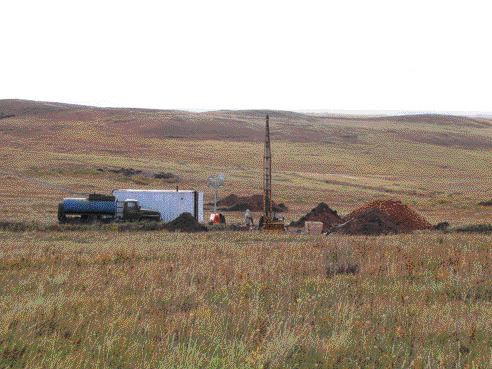After the market punished Khan Resources (KRI-T, KHRIF) and Western Prospector Group (WNP-V) shares last month on news that some exploration licences for uranium projects in Mongolia were being revoked, both companies caught some bounce on speculation that things may not be as dire as first thought.
On Aug. 17, Khan announced the exploration licence covering its 100%-owned Additional Dornod uranium project had been declared invalid by a branch of the government known as the Mineral and Petroleum Resources Authority of Mongolia (MRPAM). The news sent its shares down as much as 63% to $1.06 from the previous day’s close of $2.79.
But just five days later, on Aug. 23, the company saw its stock jump 41% to $1.88 after issuing a release clarifying the property’s status. Khan said discussions with the government revealed that the licence had not been declared invalid, but is under review, and may be declared invalid in the future.
“I’m not sure they actually meant it,” says Martin Quick, Khan’s president and chief executive. “We’re trying to sort out what they meant. Right now, the licence has not been invalidated. We’re still waiting to find out what it is we have to do.”
A report by Marin Katusa, a senior investment strategist with Phoenix, Ariz.-based Casey Research, argues the impetus behind MRPAM’s move was not to take away the projects, but to extract more money from companies and move development along.
“From what we’ve gleaned,” Katusa says, “it’s unlikely that any of these licences will actually be revoked. Instead, the end result will be that companies who hold these exploration licences ‘under review’ will be forced to ante up and buy mining licences.”
But in Khan’s case, such an assessment doesn’t hold water.
“I wish it were that simple,” Quick says of Katusa’s analysis. He notes that Khan has been trying to secure a mining licence for Additional Dornod but hasn’t been able to because the Mineral Council isn’t around to approve its resource estimate — a necessary precondition to upgrading the licence.
Quick says the Mineral Council hasn’t convened in roughly two years.
“It’s a catch-22,” he says. “You have to get them to approve it, but you can’t get it approved because the body that approves it doesn’t meet.”
Such confusion is part of the cost of doing business in Mongolia — a former communist country that periodically shows signs of embracing the free market, only to relapse into old socialist habits.
The result is that while foreign investors like Khan are encouraged to exploit the country’s mineral resources by some politicians, they are derided by others for “robbing” the nation of its mineral wealth.
Still, for Katusa, the situation in Mongolia is an opportunity for investors willing to persevere.
“We’ve travelled to Mongolia, and everything we saw there indicates that it will move towards a capitalist model, albeit haltingly and with the occasional missteps,” Katusa says. “The (investment) opportunity remains.”
The reason that the government is targeting Additional Dornod and Western Prospector’s Gurvanbulag deposit is that — according to factions of the government — in the past, exploration at both properties has been funded by the state. Under Mongolia’s mining law, the government has the right to earn up to a 50% stake in projects where state funds were used for exploration or other purposes.
But both Additional Dornod and Gurvanbulag were drilled by the Russians with Soviet, not Mongolian money, the two companies say.
“For Mongolians to now claim that it was money they put in, is just as far as we’re concerned. . . well, we’re saying, show us,” Quick says.
While he says the government has made strides in establishing its fledgling democracy, it still has a ways to go towards constructing a transparent system and engaging in open dialogue with companies doing business there.
“No one called us,” Quick says, before the company received a letter that said the licence was invalid. “No one said, ‘you better do something with your exploration licence.’ We could have sorted it out if they did. It came absolutely out of the blue.”
In all, MRPAM initially said it was cancelling 34 exploration licences, which would affect 18 companies.
Khan has a 100% stake in Additional Dornod, which is covered by the exploration licence that was initially declared invalid. Additional Dornod has a resource of roughly 16 million lbs. U308.
Khan’s mining licence for Dornod remains unaffected. It has a 58% interest in the 48 million lbs. U308 that are covered by that mining licence.
Western Prospector’s Gurvanbulag deposit contains an indicated resource of 2.83 million tonnes grading 0.22% U308 for about 13.6 million contained pounds U308, plus an additional 2.67 million inferred tonnes at 0.15% U308.
While Western Prospector shares were harder hit than Khan’s, they followed roughly the same trajectory. Western Prospector shares were trading at $3.40 before the news broke, and went as low as 96, but after Khan’s latest news release regarding the status of its licence.


Be the first to comment on "Khan Wades Through Mongolia’s Murky Waters"